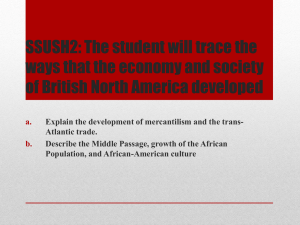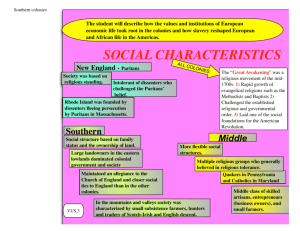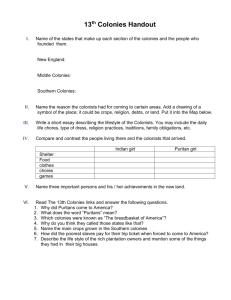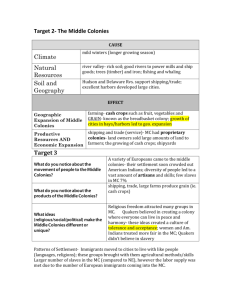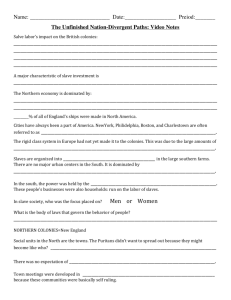06-Colonial Society, the Great Awakening, and the
advertisement
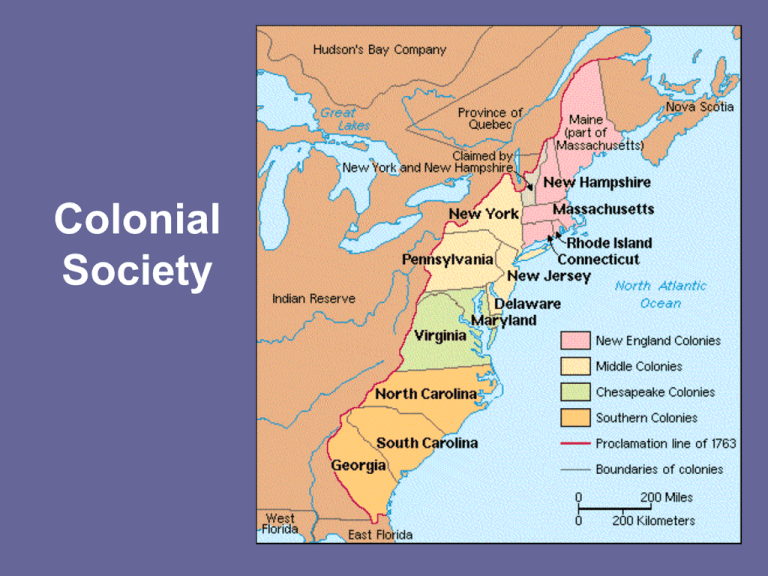
Colonial Society Southern Society • Planter Elite: Wealthy landowners controlling large plantations raising cash crops in the coastal regions Backcountry Farmers: Small farmers that lived to the west and away from the coast and lived by subsistence farming, growing crops and raising animals to feed themselves • – • Often formal indentured servants Indentured Servants: prevalent in the 1600s, but dramatically decrease by 1700 African slaves: become increasingly prevalent by 1700 • – Few if any legal rights, especially after the Stono Rebellion Slavery in the Colonies • • • • • Royal African Company is created in 1672 to allow English individuals to join the slave trade Most slaves were taken from West Africa and brought across the Atlantic Ocean along the Middle Passage From 1450 and 1870, somewhere between 10 & 12 million Africans were forcibly brought to the New World, with about 2 million dying at sea Of the 8-10 million Africans that survived the journey to the Americas, approximately 500,000 are brought to North America States begin gradually reducing the rights of Africans and begin writing slave codes that formally regulate and define the conditions of slavery • New England Economy • • New England is largely unsuitable for cash crops, instead being dominated by subsistence farmers Geographic influences though make New England productive for fishing, whaling, lumbering, and therefore shipbuilding • Triangular Trade: Simplified three-way exchange of goods – Africa – Slaves and Gold – Caribbean – Sugar – New England – Rum – Northern and Southern Colonies exchanged raw goods for manufactured goods made in England New England Society • • Dominated by Puritans and their religious lifestyle Puritans took care to watch over their neighbors, with religious and economic distinctions helping lead to the Salem Witch Trials Middle Colonies Economy • Not suited to Southern cash crops, but some of the most fertile land in the colonies • Farmers were able to grow surpluses of wheat and other food crops • Large navigable rivers allow inland farmers to ship to the coasts • Area at the end of these rivers became largest cities in the colonies, Philadelphia and New York City • Initially, free/low cost land is available in Pennsylvania and attracts a growing population, but as in other areas, class distinctions emerge • Describe how the three colonial regions (Southern Colonies, New England, and Middle Colonies) developed distinct, but interrelated economies: • Describe the role of slavery in this interrelated economy: The Great Awakening • Origins – Religious Revivalism • Clergy react to perceived decline in piety 1720-50 (elements last until American • – Began in Europe and England • John Wesley and Methodism Anglican minister George Whitefield • – Speaking from Georgia to New Hampshire in 1739— » First National Event in America American Experience • General Characteristics – – – – – – Cuts across all class, race/ethnic, geographic lines Focused on pietism, stressing individual piety and union with God Faith spread at revivals, large meetings for preaching and prayer Leads to denominationalism Fosters religious tolerance Brings Africans and Native Americans to Protestantism • Jonathan Edwards – Concern for corruption of human nature and divine wrath – Need for immediate repentance – “Sinners in the Hands of an Angry God”—1735 Long Range Effects – – – – – Authority and status of established clergy were permanently weakened Destroyed identification of churches with territorial boundaries—preachers moved around and preached anywhere Destroyed institutional religion as the organizing framework of small group society (esp. Puritans). Lead to schisms—Old Lights vs. New Lights Foundation of new denominations Fostered separation of church and state • Describe the Great Awakening and its impact on the development of the colonies: Enlightenment • Origins: Philosophy/ideology inspired by 17th and 18th century European scientific revolution – Heliocentric (sun-centered) belief espoused by Copernicus replaces old Ptolemaic view of earthcentered universe – Sir Isaac Newton—mechanistic universe according to Natural law. Implied that natural law governed all things, i.e., human relations, politics, economics, and society. • Authors: Thomas Hobbes, John Locke, Baron de Montesquieu, Jean Jacques Rousseau, Adam Smith, David Hume Applications: • Economics—reason could make people aware of the natural law of supply and demand • Politics—limits and functions of government determined by natural rights to life, liberty, and property • Theology—favors reason over faith or denominational belief – Deism—God as clockmaker, rational creator – Evil results from imperfect understanding of natural law, not original sin, innate depravity • Society—belief in human’s innate goodness and perfectability Influences on the Colonies and United States • John Locke – Stressed that humans were born as blank slates instead of having a sinful nature – Humans are born with “natural rights” of life, liberty, and property – People then have the right to rebel against the government if it does not protect their natural rights – Political ideas on human rights will shape the Declaration of Independence • Baron Montesquieu – Suggests the separation of powers in government to protect the liberties of the people – This idea will shape the United States Constitution American Elements: • Education—18th century America was the most literate society of the times – New England—Massachusetts public schools 1647 • 90% of adult white males/40% adult white females could read and write • Other colonies—literacy rate varied 35%50% • England—literacy rate 30% • Location—Coastal areas, cities, some plantations • Characteristics—educated, intellectually curious elite, established members of society • Advocated an educated, informed, politically active population that is eternally vigilante in monitoring the balance of forces working within the government • Individuals – – – – George Washington Thomas Jefferson Benjamin Franklin Thomas Paine • Describe the Enlightenment and its impact on the development of the colonies:


